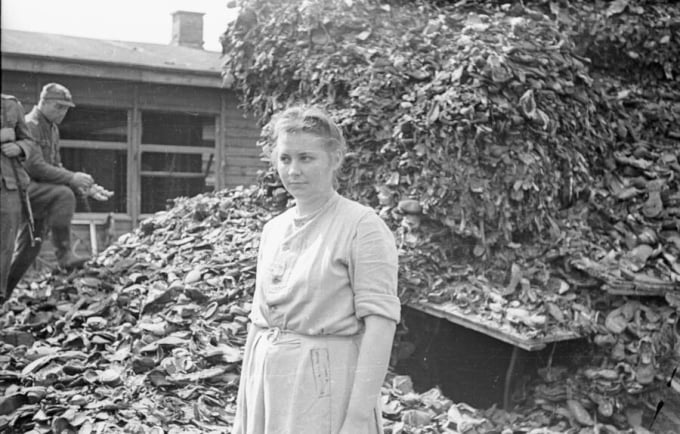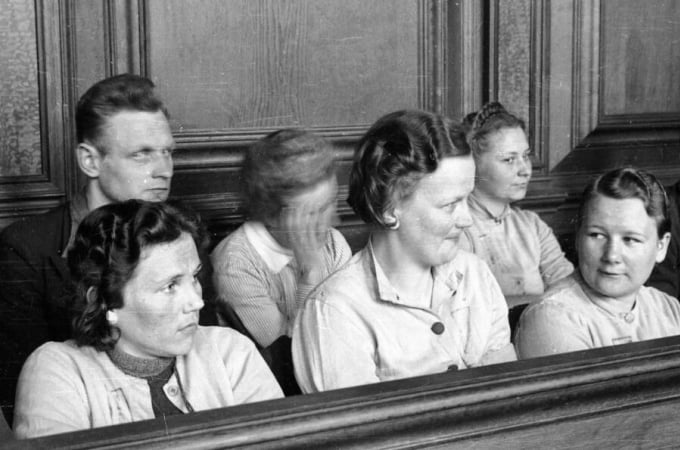Jenny-Wanda Barkmann, a Nazi concentration camp guard in Poland, was praised for her beautiful appearance but notorious for her cruelty.
Jenny-Wanda Barkmann was born on May 30, 1922 in Hamburg, Germany, and had a normal childhood like many others before the rise of fascism.
Just before Barkmann turned 11, Adolf Hitler became chancellor of Germany. When Barkmann turned 16, Jewish homes, businesses, and synagogues were targeted in the Kristallnacht (Night of Broken Glass) pogroms of November 1938. Soon after, Hitler invaded Poland and World War II began.
Barkmann initially hoped to use her good looks to become a model. But the prolonged war changed her mind. In 1944, the then 21-year-old decided to become an Aufseherin (female guard) at the Stutthof concentration camp in Gdansk, Poland.
The United States Holocaust Memorial Museum says that during World War II, up to 100,000 people were sent to Stutthof and about 60,000 died there. Many died from diseases such as typhus, but many others were taken to the gas chambers by guards to be executed.

Jenny-Wanda Barkmann stands in front of a pile of shoes at the Stutthof centre in Gdansk, Poland. Photo: ATI
Barkmann was one of 3,700 female guards in the Nazi concentration camps, out of a total of 55,000 guards. She quickly became known as one of the most brutal women in the Stutthof camp.
Barkmann did not hesitate to beat prisoners to death and regularly sent women and children, who were unfit to work, to the gas chambers. Jenny-Wanda Barkmann was nicknamed "the beautiful ghost".
As Barkmann became a household name in Stutthof, World War II was drawing to a close. In April 1945, Adolf Hitler committed suicide in Berlin. A month later, Germany surrendered. Barkmann fled Stutthof and became one of the most wanted Nazis. She was on the run for four months before being arrested at the Gdansk train station in Poland.

Jenny-Wanda Barkmann (far right in back row) at a court hearing. Photo: Historydefined
During her interrogation, Barkmann claimed to have always treated Jewish prisoners well, even claiming to have saved some of their lives. However, dozens of surviving prisoners at Stutthof testified against Barkmann in court, describing the atrocities she had committed. Even the defense attorney admitted Barkmann's guilt, but argued that she was mentally ill. He said no sane person could have committed such atrocities at the Stutthof concentration camp.
Meanwhile, Barkmann offered no defense in court. Faced with charges of murder and cruelty, she responded with a contemptuous smile. Barkmann did not beg for forgiveness, nor did she shed tears or show remorse.
When sentenced to death, Jenny-Wanda Barkmann said "life is really great joy and joy often doesn't last long".
On July 4, 1946, Jenny-Wanda Barkmann and other war criminals were taken to Biskup Hill near Gdansk to be publicly executed by hanging. Up to 200,000 people watched the execution, and their hatred of Barkmann was clear. The guard died at the age of 24. For humanitarian reasons, the authorities later stopped holding public executions.
Thanh Tam (According to ATI )
Source link


![[Photo] Summary of parade practice in preparation for the April 30th celebration](https://vstatic.vietnam.vn/vietnam/resource/IMAGE/2025/4/11/78cfee0f2cc045b387ff1a4362b5950f)
![[Photo] Prime Minister Pham Minh Chinh chairs meeting to discuss tax solutions for Vietnam's import and export goods](https://vstatic.vietnam.vn/vietnam/resource/IMAGE/2025/4/10/19b9ed81ca2940b79fb8a0b9ccef539a)


![[Photo] Phuc Tho mulberry season – Sweet fruit from green agriculture](https://vstatic.vietnam.vn/vietnam/resource/IMAGE/2025/4/10/1710a51d63c84a5a92de1b9b4caaf3e5)


























































































Comment (0)